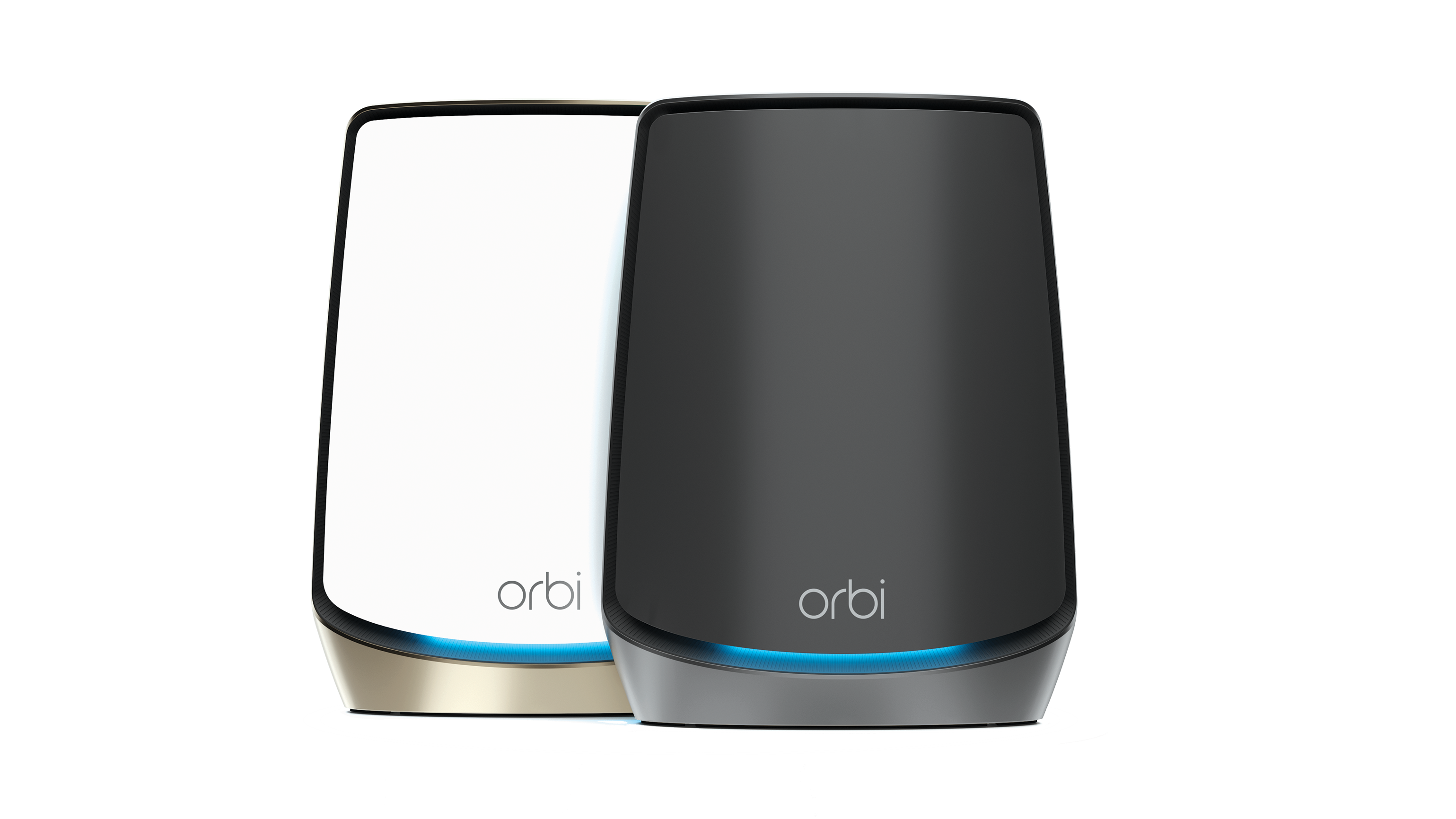Netgear Orbi RBK863S review: A fine mesh three years ago
A decent Wi-Fi 6 mesh, but the only thing that's exceptional about this Orbi system is the price

-
+
Stylish design
-
-
Expensive
-
-
Poor performance

Netgear's Orbi meshes aren't cheap, but they typically offer excellent performance and a decent set of features. The latest model stretches the formula, though. It's an update to the Orbi RBK852, Netgear's first flagship Wi-Fi 6 mesh, but while it's still very much priced as a flagship product, it brings only modest enhancements to the original design.
Most notably, the Wi-Fi hardware hasn't been upgraded at all. Most high-end meshes have moved to Wi-Fi 6E, but the RBK863S uses the same Wi-Fi 6 configuration as the RBK852. In fairness, it's a beefy tri-band system, with 2.4GHz and 5GHz connections for clients, plus an additional 5GHz network that the mesh stations use to communicate with one another.
The 5GHz networks both support 4x4 MIMO, allowing for a maximum connection speed of 2.4Gbits/sec, and Netgear claims the RBK863S introduces a new antenna design with 20% better coverage than the original, so the three units can purportedly reach an area of 740m2.
There's one other upgrade to the hardware: the WAN connector has been boosted from 2.5Gbits/sec to 10GbE. This isn't much of a selling point, though, as the number of people in the UK who have an internet connection faster than 2.5Gbits/sec must be tiny. More to the point, even if you do have an ultra-fast broadband line, the Orbi RBK863S won't convey the full speeds it's capable of. That's because the LAN ports are stuck at single-gigabit speeds, while (you will recall) the wireless hardware tops out at 2.4Gbits/sec. It would have made much more sense to leave the WAN port alone and add multi-gig Ethernet on the LAN side.
So much for the design: how does the Orbi RBK863S perform? To find out, we set up the system in a home setting, with the primary unit in a study, the second in the adjoining bedroom and the third in the downstairs living room. We then carried a standard test laptop to various rooms in the house and measured average download speeds over the 5GHz network.
The results weren't shabby. When the laptop was in the same room as the primary Orbi station, we recorded an average download speed of 84MB/sec. This dropped off only to 72MB/sec in the living room, with a minimum of 41MB/sec in the kitchen. While that's fast enough to meet most people's needs, however, it's not special enough to justify the price. In fact, the RBK863S struggled to keep up with the much cheaper Orbi RBK763S. That mesh gave us download speeds ranging from 97MB/sec in the study to 47MB/sec in the kitchen -- and it's fully £500 cheaper.
There's a simple reason for this. The ageing radio hardware in the Orbi RBK863S is limited to a maximum channel width of 80MHz, whereas modern meshes – including the RBK763S – almost invariably support the fatter 160MHz option. The RBK863S does have the benefit of 4x4 MIMO, but most devices you're likely to be connecting from are limited to 2x2 multiplexing, so you'll only see a benefit from the RBK863S's 4x4 provision if you're connecting from two devices at once.
It's a shame, because Netgear's software features are, as usual, pretty good. To set up the system, you just need to scan the QR code into the Orbi mobile app to connect, then choose a network name and security settings. You can then use either the app or a slick web portal to manage your network; the interface and features are exactly the same as with other Orbi meshes, including Netgear's incoming VPN server that lets you connect to your home network from anywhere.
What's more, the "S" at the end of the model name denotes a bundled year of Netgear's Armor network security service, which was an optional extra with the RBK852. However, after your 12 months have run out, you're looking at £85 a year to keep it going, and parental controls are another £50 on top of that. It's a bit of a mickey-take when you've already paid so much for the mesh itself.
Indeed, the whole deal feels like Netgear is pushing its luck. The Orbi RBK852 was a fine mesh in its day, but that was three years ago, and the technology has moved on. When it comes to performance, the RBK863S can't hope to keep up with Wi-Fi 6E meshes such as TP-Link Deco XE75 or Netgear's own superlative Orbi RBKE963, which hit an amazing 118MB/sec in our tests. By the end of the year we're expecting to see the first Wi-Fi 7 systems, promising a four-fold performance boost over 6E. If you're focused on value rather than performance, meanwhile, the RBK863S makes even less sense.
You can get the Orbi RBK763S for a much lower price, while the Mercusys Halo H80X provides all the bandwidth an average family home requires for only £162. No matter what you're looking for, the idea of paying £1,099 for the RBK863S is frankly laughable.
Netgear Orbi RBK863S specifications
| Band support | Tri-band |
| Radios | 2.4GHz/5GHz/5GHz |
| Additional features | Wi-Fi 6 router, 4x4 MU-MIMO 6 internal antennas (eachstation) 4 x gigabit Ethernet ports (eachstation) 10GbE WAN port |
| Dimensions (WDH) | 191 x 71 x 254mm |
| Warranty | 1yr warranty |
Get the ITPro daily newsletter
Sign up today and you will receive a free copy of our Future Focus 2025 report - the leading guidance on AI, cybersecurity and other IT challenges as per 700+ senior executives
Darien began his IT career in the 1990s as a systems engineer, later becoming an IT project manager. His formative experiences included upgrading a major multinational from token-ring networking to Ethernet, and migrating a travelling sales force from Windows 3.1 to Windows 95.
He subsequently spent some years acting as a one-man IT department for a small publishing company, before moving into journalism himself. He is now a regular contributor to IT Pro, specialising in networking and security, and serves as associate editor of PC Pro magazine with particular responsibility for business reviews and features.
You can email Darien at darien@pcpro.co.uk, or follow him on Twitter at @dariengs.
-
 Third time lucky? Microsoft finally begins roll-out of controversial Recall feature
Third time lucky? Microsoft finally begins roll-out of controversial Recall featureNews The Windows Recall feature has been plagued by setbacks and backlash from security professionals
By Emma Woollacott Published
-
 The UK government wants quantum technology out of the lab and in the hands of enterprises
The UK government wants quantum technology out of the lab and in the hands of enterprisesNews The UK government has unveiled plans to invest £121 million in quantum computing projects in an effort to drive real-world applications and adoption rates.
By Emma Woollacott Published
-
 Businesses are taking their eye off the ball with vulnerability patching
Businesses are taking their eye off the ball with vulnerability patchingNews Security leaders are overconfident in their organization’s security posture while allowing vulnerability patching to fall by the wayside.
By Jane McCallion Published